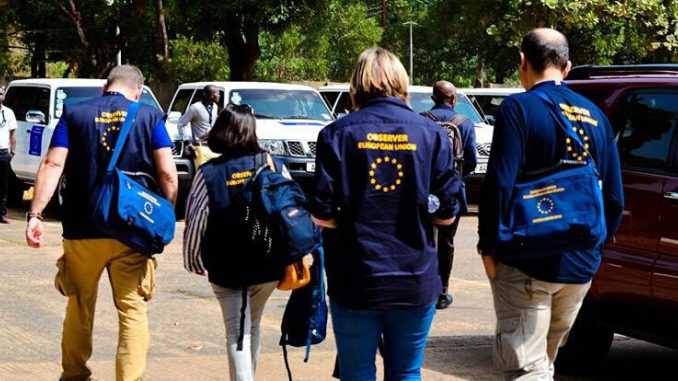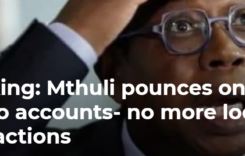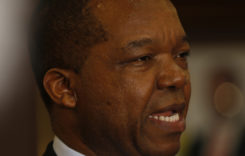Zimbabwe has extended an invitation to international organisations and other countries to observe its 2023 general elections, but underlined that their role will be “solely to observe not to monitor the election processes.”
In a statement at the signing of an agreement ahead of the deployment of an EU Election Observer Mission (EOM) to the Zimbabwe August 23 general election, Acting Minister of Foreign Affairs and International Trade Amon Murwira said President Emmerson Mnangagwa’s government expected all observers “to maintain strict impartiality, objectivity and independence” in discharging their duties.
What is the difference between election observers and monitors?
Election observers are by law and practice restricted to observing and collecting information on election proceedings, and largely limited to releasing their assessments after the elections. While the observers are free to engage stakeholders in the electoral processes, the protocols prohibit them from engaging in a manner that could be interpreted as interfering or affecting the election processes.
On the other hand, monitors observe the election processes and have some powers to raise issues and recommend changes in the conduct and management of processes during the actual elections to help improve the credibility of the vote.
What protocols govern deployment of Election Observer Missions (EOM)?
In line with international protocols, the EU, like all other observers, deploys an Election Observer Mission (EOM) at the invitation of the host country.
The European Commission and the European External Action Service (EEAS) selects election observers from candidates proposed by EU Member States.
The European Parliament may also decide to send a separate delegation to observe the elections. This parliamentary delegation is integrated in the EU EOM and works closely with the chief observer and does not issue a separate assessment.
Timing
The EU EOM is normally deployed in a country about between 8-6 weeks prior to election day, with long-term observers arriving to assess the preparations for the election at regional level around 5-4 weeks before polling. The short-term observers arrive shortly before election day in order to increase the observation capacities of the mission during polling, counting and the aggregation of results.
A preliminary statement is then presented by the chief observer at a press conference shortly after election day (usually 48 hrs after election day) based on long-term and short-term observations of the entire process.
A final report contains the EOM’s conclusions and recommendations regarding the whole electoral process. It is delivered within a month of the EOM ending its activities on the ground. This report gives guidance for electoral reform and possible future assistance.
Does the mission intervene?
Election observation missions (EOMs) do not interfere in electoral processes.
They only have the mandate to collect and verify information concerning the election process, analyse the observations and then, after the elections, to publish their findings.
As a rule, EU EOMs always operate in a country on the basis of an invitation of the host government.
Key Areas
The assessment of the elections is based on seven key criteria that have been adopted by the European Union in assessing the quality of elections and which are assessed against regional and international standards.
These include:
- The degree of impartiality shown by the election administration
- The degree of freedom of political parties and candidates to assemble and express their views
- The fairness of access to state resources made available for the election
- The degree of access for political parties and candidates to the media, in particular the state media
- The universal franchise afforded to voters
Any other issue which concerns the democratic nature of the election e.g. campaign violence, rule of law, legislative framework, the conduct of polling and counting of votes.
Long-term observers (LTOs) are ideally deployed around one month before election day and remain after the results are officially announced to observe the resolution of electoral disputes. They are located all over the country and observe the unfolding electoral campaign. They also address particular issues, such as the use of public resources by candidates.
Short-term observers (STOs) are deployed to observe the polling day and the early counting of ballots. They are deployed in teams of two. LTO report regularly and prepare the STOs observation programme in their area.
How big is the EU Election Observer Mission to Zimbabwe?
The EU Ambassador to Zimbabwe Jorbst von Kirchmann says the EU expects to have 150-member EOM – with 11 election experts coming into the country in the first week of July, 46 long-term observers in mid July and 44 short-term observers coming in on the eve of voting day. These observers would be boosted by officials drawn from embassies of EU countries in Zimbabwe.
Who will lead the EU Election Observer Mission?
The team will be led Italian Member of the European Parliament Fabio Castaldo.
What does the EU-Zimbabwe agreement on the EOM cover?
The agreement signed in Harare on June 30 includes commitment to protocols on impartial election observation, respect for Zimbabwe electoral laws and EU guidelines on election observation that EU observers are obliged to apply universally and administrative and security support and guarantees from Zimbabwean authorities, according to both EU Ambassador to Zimbabwe Jorbst von Kirchmann and Minister Amon Murwira.
What Sources:
https://www.veritaszim.net/node/2424
https://www.eeas.europa.eu/eeas/eu-election-observation-missions-1_en
Related content:
Do you want to use our content? Click Here












